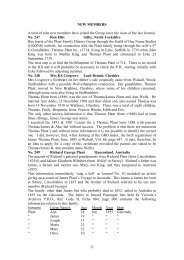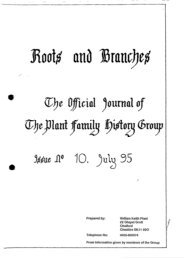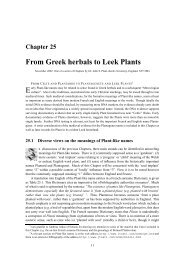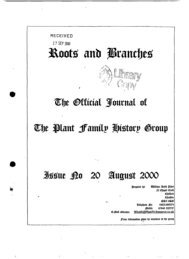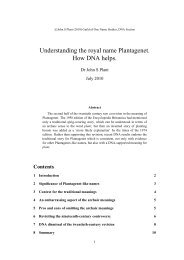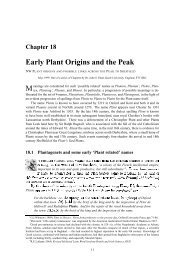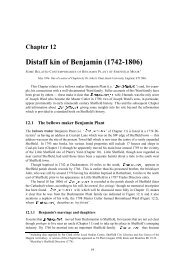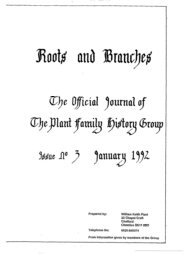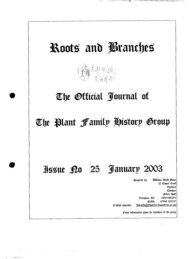Chapter 34 Austin Plant - Plant Family History Group
Chapter 34 Austin Plant - Plant Family History Group
Chapter 34 Austin Plant - Plant Family History Group
You also want an ePaper? Increase the reach of your titles
YUMPU automatically turns print PDFs into web optimized ePapers that Google loves.
utler to the earl of Norfolk 108 whose mother, Maud Marshal, held lands in the Welsh Marches.<br />
Maud’s marriages formed close ties amongst the Norfolk-Longspée-Warenne nobility 109 . As both<br />
the Longspées and the Warennes were illegitimate descendants of Geoffrey <strong>Plant</strong>e Genest, there<br />
could have been a connection between the <strong>Plant</strong>egenest name and that of Norfolk’s butler <strong>Plant</strong>eng’<br />
or <strong>Plant</strong>yn, perhaps inspired by the <strong>Plant</strong>e Genest nickname; and, moreover, further evidence indicates<br />
that a cultural influence could have extended locally to the names la <strong>Plant</strong>eland, <strong>Plant</strong>efolie and<br />
Plonte, though various other opinions have been proffered for <strong>Plant</strong>: sprig; cudgel; young offspring;<br />
from the plantation; gardener; or, a tender or delicate individual.<br />
As one possibility, it can be conjectured that the <strong>Plant</strong>s were a family from Wales, with a Welsh<br />
meaning to their name, who migrated around the coast to East Anglia. It may be relevant that royal<br />
galleys were in 46 ports around the south coast of England in 1205, from Gloucester to Lynn; and,<br />
in 1208, Welsh mariners were impressed into service 110 . The <strong>Plant</strong>s may have originated near the<br />
Chepstow (Strigul) estate of Maud Marshal (d 1248) with which there is reference to the manor of<br />
la <strong>Plant</strong>eland in 1310 111 though this is spelled Plateland in 1311 112 . The <strong>Plant</strong>s’ sea trade 113 and<br />
official duties may have become associated with Longspée and Warenne lands. Across the Bristol<br />
Channel from Maud’s Chepstow estate, there is evidence for the <strong>Plant</strong> surname in Somerset 114 in<br />
proximity to the Charlton lands of the Longspée descent. Between Charlton and Keynsham 115 was<br />
Robert Plonte of Saltford (c1280) who had been bailiff of Maresfelde – this may have been Marshfield<br />
116 with its market granted in 1265 to the Abbot and Convent of Keynsham 117 . Specifically in<br />
Somerset, there is evidence for the philandering name <strong>Plant</strong>efolie in 1226 followed by Plonte near<br />
Keynsham Abbey by c1280 and there is explicit evidence that the Plonte name was hereditary here<br />
by 1329 by when the Warennes held Charlton. There are some other coincidences of proximities<br />
of the <strong>Plant</strong>s to Warenne lands and, in particular, this offers an outline of how origins near Wales<br />
could have led on to the <strong>Plant</strong>s’ presence in Norfolk and then their subsequent main homeland of<br />
east Cheshire where the illegitimate Warenne descent also settled 118 .<br />
Another possibility, however, is that the <strong>Plant</strong> surname originated with the spelling Plente – the<br />
Middle English Dictionary lists plente and plante as variant spellings of plaunt. In 1219, Radulphus<br />
Plente 119 had responsibilities for the castle and royal palace (Woodstock 120 ) of Oxford. By 1262,<br />
there is the name William Plaunte in Essex 121 followed by the names William Plauntes (1275) 122 and<br />
108 J.S. <strong>Plant</strong> (2005) op. cit., p. 131.<br />
109 Maud Marshal married Longspée’s half brother and then the earl Warenne, becoming Countess of Warenne and<br />
Norfolk. She married Hugh le Bigod, earl of Norfolk (d 1225) and, in 1225, William Warren, earl of Surrey. She bore<br />
Roger le Bigod, earl of Norfolk and John de Warenne, earl of Surrey.<br />
110 This was done by king John in 1208 at Ilfracombe. A.L. Poole, op. cit., pp. 435-6.<br />
111 Callendar of Patent Rolls, 1310 Oct. 10, Carmyle.<br />
112 Callendar of Patent Rolls, 1311 March 7, Berwick-on-Tweed.<br />
113 There were three merchants at Rouen called de la Plaunt or Plaunt in 1273. Patent Rolls, May 30, St Pauls, London<br />
and June 2, 1273, Westminster.<br />
114 Ancient Deeds belonging to the Corporation of Bath: refs. BC 151/4/14, 151/4/15, 151/3/55, 151/2/46, 151/2/47,<br />
151/3/56, 51/2/44, 151/2/27, 151/2/48, 151/2/25, 151/6/70, 151/5/90, 151/2/43, 151/2/38 (in chronological order c1280c1360).<br />
115 A dependent chapel at Charlton had as its mother house the nearby Augustinian Abbey at Keynsham. ‘Houses of<br />
the Augustian canons: The abbey of Keynsham’, in A <strong>History</strong> of the County of Somerset: Volume 2 (Victoria County<br />
Histories, 1911), pp. 129-32. Keynsham Abbey was visited by Edward I in 1276 on his way from Bath to Bristol.<br />
116 This is recorded as Maresfeld in 1221. Ekwal, The Concise Oxford Dictionary of English place-names, (Oxford,<br />
1960), p. 316.<br />
117 Placita de Quo Warranto, Edward I-Edward III in Curia Receptae Scaccarii Westm. Asservati, ed. W. Illingworth<br />
(London, 1818), p. 249. An earlier market at Marshfield had been granted to the Abbot and Convent of Keynsham on 17<br />
Jan 12<strong>34</strong> but was levelled in August 12<strong>34</strong> because it was detrimental to that at Bristol: Close Rolls of the Reign of Henry<br />
III, 14 vols (London, 1902-38), 1231-<strong>34</strong>, pp. 369, 499, 502.<br />
118 J.S. <strong>Plant</strong> (2005) op. cit., pp. 131-2.<br />
119 3 Henry III Pipe Rolls. Also, Radulphus Plente, A cartulary of the Hospitals of St John the Baptist, ed H.E. Slater<br />
(Oxford, 1914) in Oxford Historical Society Publications, 68, p. 202.<br />
120 Though Beaumont Palace had been the king’s residence in the city of Oxford, the record refers to the king’s dwelling<br />
‘outside the town’ suggesting Woodstock where Henry II had frequently come for hunting. A.L. Poole, op. cit., pp. 236-7.<br />
121 Pleas of the Forest (PRO).<br />
122 Rotuli Hundrederum (London, 1812-18).<br />
59



